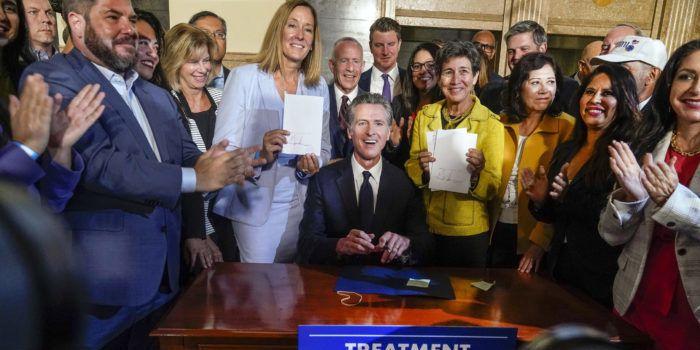(Headline USA) Having previously failed to solve his state’s homeless problem by inviting more of them to move there, California’s Democrat Gov. Gavin Newsom continued his gradual shift toward the center as he seeks to hide his record of failure in the event of a last-minute presidential run should President Joe Biden drop out.
Instead, Newsom appeared to back the solution that many conservatives have advocated: a return to the sorts of state-run institutions—colloquially known as insane asylums—that offered treatment and shelter for mentally-ill patients until they fell out of vogue in the 1970s and ’80s.
It’s time to bring back insane asylums. @VivekGRamaswamy says the number one psychiatric institution right now is jail and people leave there in a worse psychiatric condition than when they entered pic.twitter.com/LaOgCSu832
— Jesse Watters (@JesseBWatters) October 3, 2023
Newsom signed two major pieces of legislation Thursday to transform the state’s mental health system and address the state’s worsening homelessness crisis, putting them both before voters in 2024.
The Democratic governor needs voters’ approval because he wants to borrow billions of dollars through a bond to pay for the proposals.
They would allow the state to borrow $6.38 billion for 11,150 new treatment beds, housing and 26,700 outpatient treatment slots to serve up to 100,000 people a year. The measure also would overhaul how counties pay for mental and behavioral health programs.
Newsom spoke to state and local leaders at an event Thursday in a historic hospital in Los Angeles, cheered by those present as he signed the measures. The mostly vacant General Hospital is being converted into roughly 1,000 affordable units.
Newsom said the proposals will transform the outdated system, adding he understands why residents in California have grown increasingly frustrated with the crisis. If voters approve of the plan in March, the proposals would also give the state $2.4 billion in the next five years to help train 65,000 workers.
“Today, again, is about holding ourselves to a higher level of accountability and higher level of expectation,” Newsom said before he signed the two pieces of legislation. “It’s about creating a framework where we actually can deliver.”
Los Angeles Mayor Karen Bass joined Newsom at the event, appearing to underscore that the new loony bins would offer a kinder, gentler version of the type of treatment that lost support after fictional portrayals like the 1975 Oscar-winning film One Flew Over the Cuckoo’s Nest (based on Ken Kesey’s 1962 novel) about an Oregon asylum; and Geraldo Rivera’s 1972 exposé of Willowbrook State School in Staten Island, New York.
“Here in L.A. and throughout our city and state we know that we are facing a crisis,” Bass said. “We are going to transform the system, but we’re also doing something that should’ve been done 50 years ago, and that is build the beds and facilities to make sure that people can get the treatment they need.”
The proposals will appear together as one item on the March 2024 ballot, when voters will also be weighing in on the state and presidential primaries.
Newsom and supporters said the spending would help the state make a dent in its growing homelessness crisis. It would mark the first major update to the state’s mental health system in 20 years.
“It’s a crisis that we have turned away from for too long,” said Democratic Sen. Susan Eggman, who authored the bill that would reform how mental health services are funded. “The days of looking away are gone.”
Voters in 2004 approved a special tax on millionaires that has been used to fund mental health programs. Newsom wants to add more restrictions to how local governments can spend that money.
Under his proposal, two-thirds of revenue from the tax would pay for housing as well as services for people who are chronically homeless and have severe mental illnesses, and drug and alcohol addiction. The changes would also help the state better assess programs’ outcomes by requiring counties to provide uniform reports of how they spend the money.
“Today we don’t get a clear sense of what’s actually happening,” Mark Ghaly, secretary of the California Health and Human Services Agency, told reporters Thursday.
“That changes with this,” he continued. “We’ll get to establish statewide measures that matter for Californians to see that difference.”
The proposals won overwhelming support from state lawmakers, some of whom said the reforms are “long overdue.” But local counties said the new spending requirements would result in a loss of more than $1 billion, which could be detrimental to existing programs such as mental health outpatients, crisis, recovery and peer-supported services.
Some Republican lawmakers also criticized Newsom’s plan to borrow more money when the state faces budget shortfalls.
It’s one of several efforts by Newsom to reform California’s mental health system. Last year, Newsom signed a law that created a new court process where family members and others could ask a judge to come up with a treatment plan for some people with specific diagnoses, including schizophrenia.
That law would let the judge force people into treatment for up to a year. The program launched in seven counties in early October.
Newsom signed a law earlier this week that would make it easier for authorities to compel treatment for people with untreated mental illness or addictions to alcohol and drugs, many of whom are homeless.
California is home to more than 171,000 homeless people—about 30% of the nation’s homeless population. The state has spent more than $20 billion in the last few years to help them, with mixed results.
Adapted from reporting by the Associated Press

